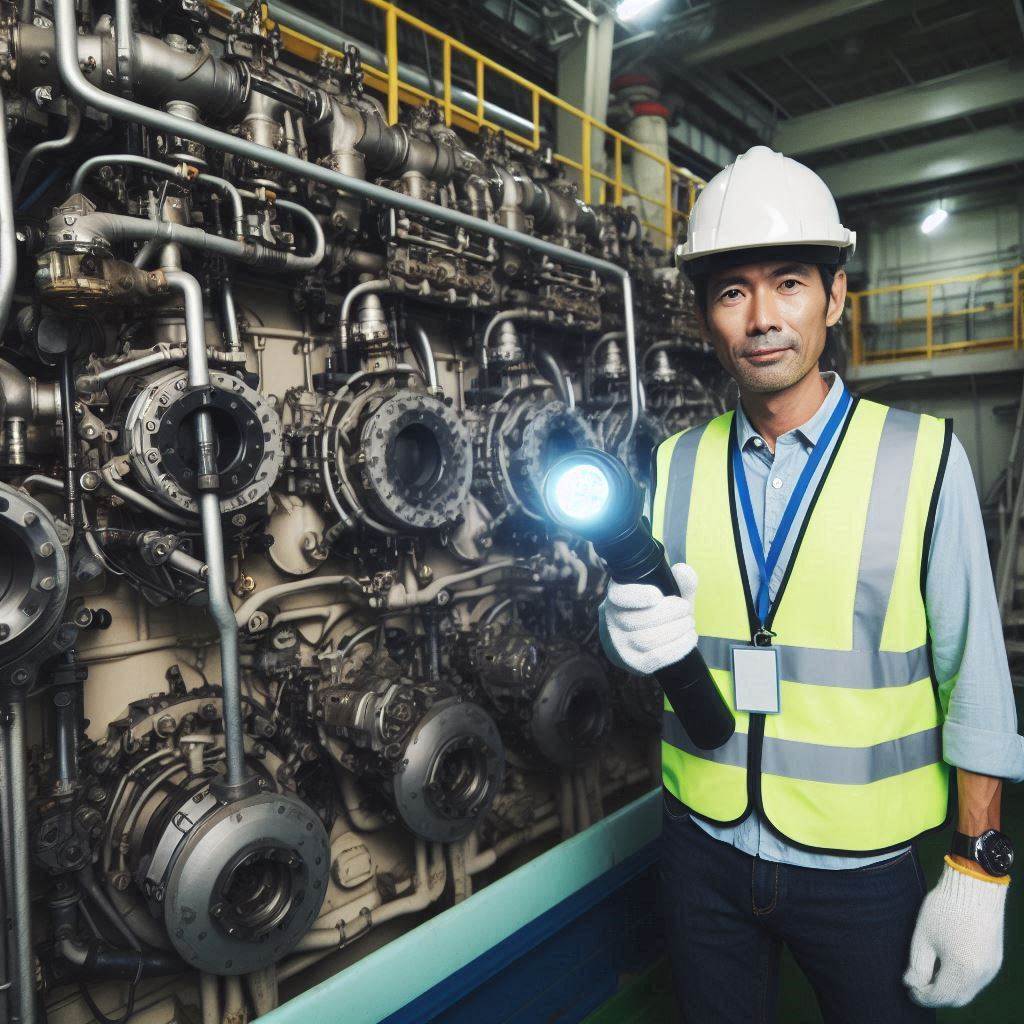Introduction
Marine engineers play a crucial role in the maritime industry.
They design, build, and maintain ship systems and equipment.
Their work ensures vessels operate efficiently and safely on the water.
Marine engineers work on engines, propulsion systems, and other critical machinery.
They also handle repairs and upgrades to keep ships in top condition.
Career growth is vital in this dynamic field.
The maritime industry continually evolves with new technologies and regulations.
Advancing in your marine engineering career opens up opportunities for higher responsibilities and better positions.
It also allows you to stay ahead of industry changes and innovations.
Professional advancement can lead to more significant roles and higher salaries.
It involves gaining specialized skills and certifications relevant to marine engineering.
Networking with industry professionals and staying updated on trends are also essential.
These steps enhance your expertise and visibility in the field.
A marine engineer’s career growth also involves taking on leadership roles.
Supervising teams and managing projects can significantly impact your career trajectory.
Demonstrating strong leadership skills can open doors to senior positions and increased responsibilities.
Education and Training
Requirements to Become a Marine Engineer
To become a marine engineer, start with a bachelor‘s degree in marine engineering, naval architecture, or a related field.
This foundational degree covers critical areas like fluid dynamics and marine propulsion systems.
It‘s essential to complete a program accredited by relevant engineering boards or institutions.
After your degree, obtain the necessary maritime certifications, such as the Engineer Officer of the Watch (EOOW) certification.
This certification ensures your readiness to handle complex marine systems and adhere to industry standards.
Importance of Obtaining Relevant Degrees and Certifications
Relevant degrees and certifications play a crucial role in advancing your marine engineering career.
A degree provides essential knowledge and skills, while certifications validate your expertise and adherence to safety and operational standards.
Certifications like the EOOW enhance your credibility and employability in the maritime industry.
They can also lead to better job opportunities and higher salaries.
Investing in these credentials demonstrates your commitment to the profession and prepares you for specialized roles.
Continuous Learning Opportunities
Continuous learning is vital for career advancement in marine engineering.
The field evolves with technological advancements, so staying updated is crucial.
Enroll in specialized courses or workshops to learn about new technologies such as advanced propulsion systems or marine renewable energy.
Attending industry conferences and seminars offers valuable networking opportunities and insights into the latest trends.
Regularly reviewing and updating your skills, through additional certifications or a master‘s degree, can also boost your career prospects.
Practical experience through internships is equally important, providing hands-on application of your knowledge and expanding your industry connections.
By focusing on these areas‘educational requirements, relevant degrees and certifications, and continuous learning‘you will enhance your career growth and remain competitive in the dynamic field of marine engineering.
Gain Experience
Importance of Gaining Hands-On Experience in the Field
Gaining hands-on experience is essential for advancing in marine engineering.
Practical experience allows you to apply theoretical knowledge to real-world scenarios, bridging the gap between classroom learning and fieldwork.
Working directly on marine vessels and systems helps you develop crucial technical skills, such as troubleshooting, maintenance, and system operation.
This hands-on involvement is invaluable for understanding complex marine systems and improving your problem-solving abilities.
Practical experience also helps in mastering the use of specialized equipment and adhering to safety protocols, both of which are critical in the marine engineering field.
Internship and Apprenticeship Opportunities
Internships offer a significant advantage for aspiring marine engineers.
They provide exposure to various aspects of the field, such as vessel design, system maintenance, and project management.
Internships often serve as a stepping stone to full-time employment, allowing you to build a strong professional network and gain industry-specific knowledge.
Seek out internships with reputable marine engineering firms or organizations to maximize your learning and career prospects.
Apprenticeships are another valuable option for gaining practical experience.
They offer structured training programs under the guidance of experienced professionals.
Apprenticeships typically involve working on real-world projects, allowing you to learn essential skills and gain a comprehensive understanding of marine engineering tasks.
This hands-on training is crucial for developing expertise in areas like marine propulsion systems, hydraulic systems, and electrical systems.
An apprenticeship provides a well-rounded experience, preparing you for various roles within the industry.
Building a Strong Professional Network
Building a strong professional network is crucial for career advancement in marine engineering.
Networking opens doors to new opportunities, such as job offers, collaborations, and mentorship.
Attend industry conferences, workshops, and seminars to connect with professionals and experts in the field.
These events provide opportunities to engage with key players, learn about industry trends, and explore potential career paths.
Engage actively on professional platforms like LinkedIn to connect with industry professionals and stay informed about job openings and industry developments.
Joining marine engineering associations and societies can also enhance your networking efforts.
These organizations often host events, provide resources, and facilitate connections with other professionals in the field.
Developing relationships with mentors is another critical aspect of building a strong network.
Mentors offer valuable guidance, share their experiences, and provide insights into industry trends.
They can also recommend you for job opportunities and projects, helping you advance your career.
Actively seek out mentors who can offer support and advice as you progress in your marine engineering career.
In summary, hands-on experience through internships and apprenticeships is crucial for career advancement in marine engineering.
Building a strong professional network further supports your growth and success.
Both elements play a vital role in achieving long-term success and progression in the marine engineering field.
Specialization and Skill Development
Importance of Specializing in a Particular Area of Marine Engineering
Specializing in a particular area of marine engineering provides a substantial career advantage.
By focusing on a specific field, such as marine propulsion systems, naval architecture, or underwater robotics, you can develop a deep understanding of that area.
This targeted expertise sets you apart from generalists and positions you as a valuable asset to employers.
Specialization allows you to refine your skills and knowledge, making you a go-to expert in your chosen niche.
For example, if you choose to specialize in marine propulsion, you will gain extensive experience with engines, fuel systems, and propulsion technologies.
This expertise can lead to advanced roles and responsibilities that might not be available to those with a more general background.
Specialization also helps you align your career with your personal interests and strengths, providing a sense of fulfillment and motivation.
In addition, being an expert in a specific area can lead to greater job security, as companies value employees who bring in-depth knowledge to their teams.
Developing Technical Skills Through On-the-Job Training
Developing technical skills through on-the-job training is crucial for a successful career in marine engineering.
Hands-on experience with marine engineering equipment and systems provides practical knowledge that theoretical studies alone cannot offer.
Working directly with complex technologies, such as marine engines, electrical systems, and onboard automation, helps you acquire valuable skills.
For instance, troubleshooting engine malfunctions, performing routine maintenance, and understanding marine safety systems are all essential tasks that require practical experience.
This kind of training allows you to apply theoretical knowledge in real-world scenarios, enhancing your problem-solving abilities and technical expertise.
Furthermore, on-the-job training often involves working with experienced professionals who can offer mentorship and guidance.
This interaction can accelerate your learning process and provide insights into best practices and industry standards.
The practical experience gained through on-the-job training is also critical for obtaining certifications and advanced qualifications, which are often necessary for career advancement in marine engineering.
Continuous Professional Development
Continuous professional development (CPD) is essential for maintaining and advancing your career in marine engineering.
The field of marine engineering is dynamic, with rapid technological advancements and evolving regulations.
To stay relevant and competitive, it is important to engage in CPD activities that keep your skills and knowledge up-to-date.
Participating in workshops, seminars, and online courses helps you learn about the latest innovations, industry trends, and regulatory changes.
For example, advancements in digital systems and automation require engineers to update their skills regularly to manage and implement new technologies effectively.
Pursuing advanced certifications and degrees can also enhance your career prospects by demonstrating a commitment to ongoing learning and professional growth.
Networking within the industry is another important aspect of CPD.
Building relationships with other marine engineers and industry professionals can provide valuable connections, insights, and opportunities.
Attending industry conferences, joining professional organizations, and engaging with online communities are effective ways to expand your professional network and stay informed about career opportunities.
In summary, specializing in a particular area of marine engineering enhances your career prospects by establishing you as an expert in your chosen field.
Developing technical skills through on-the-job training bridges the gap between theoretical knowledge and practical application, making you more proficient in your role.
Engaging in continuous professional development ensures you remain current with industry advancements and maintains your competitive edge.
By focusing on these areas, you can achieve significant career growth and success in the marine engineering field.
Pursue Advanced Degrees
Benefits of Pursuing a Master‘s or Doctoral Degree in Marine Engineering
Pursuing a master‘s or doctoral degree in marine engineering offers numerous advantages.
These advanced degrees provide specialized knowledge that sets you apart in the field.
A master‘s degree allows for deeper exploration into areas like marine propulsion or underwater robotics.
This advanced education equips you with cutting-edge skills and prepares you for leadership roles.
A doctoral degree positions you as an expert in a specific area of marine engineering.
It opens doors to high-level research and academic roles, and positions you for senior roles in the industry.
Opportunities for Research and Innovation
Advanced degrees in marine engineering also open opportunities for significant research and innovation.
With a master‘s or doctoral degree, you can engage in pioneering projects that push the boundaries of marine technology.
This might include advancements in ship design, underwater exploration tools, or sustainable marine practices.
Your advanced education allows you to contribute to groundbreaking research and make impactful discoveries.
This involvement not only enhances your professional reputation but also advances the industry as a whole.
Career Advancement Prospects with Advanced Education
Career advancement is a major benefit of pursuing advanced degrees.
A master‘s or doctoral degree qualifies you for higher-level positions that require specialized expertise.
These roles often come with increased responsibilities and higher salaries.
Advanced education can also make you eligible for roles in management, strategic planning, or high-level consultancy.
Employers value the advanced knowledge and skills gained through further education.
This makes you a more competitive candidate for promotions and leadership positions.
Additionally, your commitment to continuous learning and professional growth can set you apart in the job market.
In summary, pursuing advanced degrees in marine engineering provides substantial benefits.
It offers specialized knowledge, research opportunities, and significant career advancement prospects.
Investing in further education can help you achieve your professional goals and contribute to advancements in the field.
Read: Sustainable Wastewater Treatment Methods
Networking and Professional Organizations
Importance of Networking within the Marine Engineering Community
Networking plays a crucial role in advancing your marine engineering career.
Building relationships with peers, mentors, and industry leaders provides numerous benefits.
Connecting with professionals in your field opens doors to job referrals and collaborative opportunities.
These connections can offer valuable advice, industry insights, and support for career decisions.
Effective networking can also lead to mentorship opportunities, helping you navigate your career path more successfully.
Joining Professional Organizations for Career Growth Opportunities
Joining professional organizations is a strategic step for marine engineers aiming for career advancement.
Organizations like the Society of Naval Architects and Marine Engineers (SNAME) provide access to resources, industry news, and educational opportunities.
Membership often includes access to certifications, training programs, and a network of professionals.
Active participation in these organizations can keep you updated on industry trends and enhance your qualifications.
Additionally, these organizations frequently offer leadership and volunteer opportunities, which can further boost your career prospects.
Attending Industry Conferences and Events
Attending industry conferences and events is essential for staying relevant in marine engineering.
Conferences provide a platform to learn from experts and innovators in the field.
These events are also opportunities to showcase your work and gain recognition.
By participating in shipbuilding expos and marine technology seminars, you can expand your professional network and stay informed about the latest advancements and technologies.
Industry events offer valuable chances to engage with key players and gain insights that can drive your career forward.
Networking, joining professional organizations, and attending industry events are all critical for career growth in marine engineering.
Each of these activities offers unique benefits, from gaining new knowledge and skills to building valuable professional relationships.
By actively participating in these areas, you position yourself for continued success and advancement in the dynamic field of marine engineering.
Read: Public Health and Environmental Engineering

Pursue Leadership Roles
Advancing to Managerial or Leadership Positions in Marine Engineering
Advancing to managerial or leadership positions in marine engineering can significantly impact your career growth.
These roles involve overseeing projects, managing teams, and making strategic decisions.
They require not only technical expertise but also strong leadership abilities.
To transition into these roles, start by seeking opportunities for additional responsibilities within your current role.
Volunteer for challenging projects that require coordination and management.
Show initiative by proposing improvements and leading efforts to enhance processes or solve problems.
Developing Strong Communication and Leadership Skills
Developing strong communication skills is crucial for effective leadership.
Good communication helps in managing teams and coordinating with various departments.
Practice active listening and clear, concise expression of ideas.
These skills are essential for resolving conflicts and ensuring team cohesion.
Enhance your leadership abilities by attending workshops and training programs focused on leadership and management.
These programs offer valuable insights and techniques for handling complex situations and guiding teams effectively.
Regularly seek feedback from peers and supervisors to understand your strengths and areas for improvement.
Transform Your Career Today
Unlock a personalized career strategy that drives real results. Get tailored advice and a roadmap designed just for you.
Start NowOpportunities for Mentorship and Knowledge-Sharing
Mentorship is a valuable asset for career advancement.
Seek mentors who have experience in leadership positions within marine engineering.
They can provide guidance, share experiences, and help navigate your career path.
Participate in industry conferences and seminars to connect with leaders and experts in marine engineering.
Engaging in these events allows you to learn from others‘ experiences and gain different perspectives on leadership challenges.
Networking at these events can lead to mentorship opportunities and career advancement.
Building a network of professional contacts also provides access to valuable advice and opportunities for knowledge-sharing.
In summary, pursuing leadership roles in marine engineering involves advancing to managerial positions.
Developing strong communication and leadership skills, and seeking opportunities for mentorship and knowledge-sharing.
By focusing on these areas, you can enhance your leadership capabilities and advance your career in the dynamic field of marine engineering.
Read: Environmental Engineering and Marine Conservation
Stay Updated on Industry Trends
Importance of Staying Current on Technological Advancements in the Field
Staying current with technological advancements is crucial for marine engineers who aim to excel in their careers.
The field of marine engineering is continuously evolving, with new tools, techniques, and technologies emerging at a rapid pace.
Engineers who remain informed about these advancements can leverage cutting-edge tools to enhance their work efficiency and effectiveness.
Being knowledgeable about the latest technological developments enables engineers to implement innovative solutions, solve complex problems, and stay ahead of competitors.
Conversely, failing to keep up with these advancements can result in outdated skills and reduced competitiveness in the job market.
Therefore, actively pursuing knowledge about new technologies is essential for maintaining a leading edge in the field.
Continuous Learning Through Conferences, Workshops, and Online Resources
Engaging in continuous learning is vital for career growth in marine engineering.
Conferences and workshops are excellent avenues for professional development, offering opportunities to learn directly from industry experts and pioneers.
These events often showcase the latest advancements, trends, and best practices in marine engineering.
Participating in hands-on workshops allows engineers to gain practical experience with new technologies and techniques.
Additionally, online resources such as webinars, e-learning platforms, and industry journals provide flexible learning options that fit into busy schedules.
These resources offer valuable insights into emerging trends and technical skills, helping engineers stay updated without geographic or time constraints.
Regularly engaging with these learning opportunities ensures that engineers maintain up-to-date knowledge and skills essential for their professional growth.
Adapting to Changing Industry Demands for Career Growth
Adapting to the ever-changing demands of the marine engineering industry is crucial for career progression.
The field is subject to rapid technological changes, regulatory updates, and evolving market needs.
Engineers who are flexible and willing to embrace these changes can position themselves for advanced roles and exciting projects.
Adapting to new industry demands often involves acquiring new skills, certifications, or specializations.
This proactive approach not only enhances career prospects but also contributes to personal growth and job satisfaction.
By staying agile and responsive to industry shifts, marine engineers can tackle new challenges, contribute innovative solutions, and achieve significant career milestones.
This adaptability is not just beneficial but necessary for long-term success and advancement in the marine engineering profession.
Read: Environmental Engineering and Corporate Social Responsibility
Seek Mentorship and Guidance
Finding a Mentor Within the Industry for Career Guidance
Finding a mentor within the marine engineering industry is crucial for career growth.
A mentor provides invaluable insights and advice.
Look for experienced professionals who have navigated the career path you aspire to.
Their knowledge can help you avoid common pitfalls and make informed decisions.
Start by networking at industry events and seminars.
These venues are ideal for meeting potential mentors.
Join professional organizations and marine engineering groups to expand your connections.
Engaging in online forums and LinkedIn groups related to marine engineering can also yield potential mentors.
When approaching a potential mentor, be clear about your goals and what you hope to achieve.
Show genuine interest in their career and seek their advice on specific challenges.
A mentor should offer constructive feedback and share their experiences to guide your career decisions.
Seeking Advice from Experienced Professionals in the Field
Regular communication with your mentor is key.
Schedule periodic meetings to discuss your progress and any obstacles you’re facing.
Be open to their suggestions and ready to act on their advice.
This ongoing dialogue helps build a stronger professional relationship.
In addition to one-on-one mentorship, seek advice from multiple experienced professionals.
Different perspectives can provide a well-rounded view of the industry.
Engage with professionals who have expertise in various aspects of marine engineering.
Participate in industry-related workshops and training sessions.
These events can provide valuable knowledge and expand your professional network.
They also offer opportunities to interact with industry leaders and potential mentors.
Consider seeking guidance from mentors in related fields, such as naval architecture or marine technology.
Their insights can complement the advice from marine engineering mentors.
Building a Support System for Career Growth and Advancement
Building a support system is essential for career advancement.
Connect with peers and colleagues who share similar professional interests.
They can offer support, share experiences, and provide advice.
A strong professional network can open doors to new opportunities and resources.
Engage with industry-related communities and online groups.
This will help you stay updated on industry trends and expand your network.
Continuously evaluate your mentorship relationships to ensure they align with your evolving career goals.
In summary, finding and maintaining a strong mentorship relationship is vital for career growth in marine engineering.
Seek out experienced professionals who can provide guidance and support.
Build a robust support system through networking and continuous learning.
This approach will help you navigate your career path effectively and achieve your professional goals.
Gain More Insights: Robotics Engineering: Key Ethical Considerations
Conclusion
In this blog, we explored essential tips for career growth and advancement in marine engineering.
We discussed strategies for enhancing your skills, networking effectively, and seeking advanced qualifications.
We highlighted the importance of gaining hands-on experience and staying updated with industry advancements.
Building a robust professional network can open doors to new opportunities and provide valuable insights.
Pursuing specialized certifications and advanced degrees can further your expertise and improve your career prospects.
We emphasized the need to continuously learn and adapt in this dynamic field.
The marine engineering sector evolves rapidly, with new technologies and regulations emerging regularly.
Staying informed and embracing new learning opportunities is crucial for staying competitive.
Career growth in marine engineering demands proactive effort.
Set clear goals, seek mentorship, and take advantage of available resources.
Attend industry conferences and workshops to keep your skills sharp and expand your knowledge base.
Prioritizing career advancement will lead to more fulfilling and rewarding opportunities.
By investing in your professional development, you not only enhance your skills but also position yourself for leadership roles and specialized positions.
Embrace continuous learning as a fundamental aspect of your career journey.
The marine engineering field requires adaptability and innovation.
By committing to lifelong learning, you ensure your skills remain relevant and valuable.




